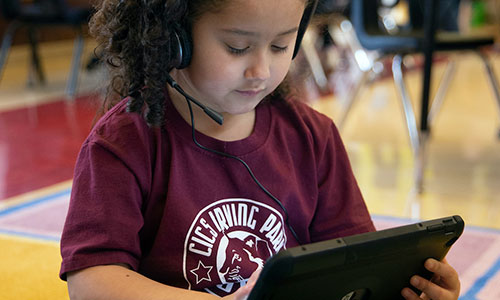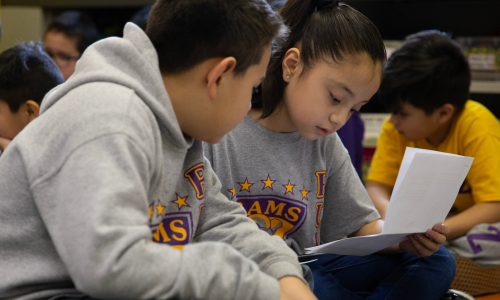
For years, MAP® Reading Fluency™ has provided teachers with critical insights into their students’ reading skills. Now, MAP Reading Fluency with Coach helps them go the extra mile with targeted practice students can complete independently and in as little as 30 minutes a week.
The best part? Coach provides personalized tutoring automatically, saving teachers time while giving young readers exactly what they need.
About MAP Reading Fluency
MAP Reading Fluency is a K–5 reading assessment designed to be administered three times a year. We recommend testing in the fall, winter, and spring.
In just one class period, MAP Reading Fluency allows a teacher to assess an entire class in both English and Spanish. Objective data shows teachers exactly where their students are in their reading journey so they can differentiate instruction effectively and successfully. MAP Reading Fluency also identifies students showing characteristics of dyslexia, so they can be given the reading support they need.
How MAP Reading Fluency with Coach works
Administering MAP Reading Fluency hasn’t changed with the addition of our new coach feature. What’s different is what happens with the results.

MAP Reading Fluency with Coach facilitates differentiating instruction
Understanding the data from any assessment is only half the battle. Teachers also need to be able to confidently use that data to differentiate instruction so all the students in their class can meet learning objectives.
Differentiation can be immensely time consuming, of course, especially for newer teachers still developing their practice. This is where MAP Reading Fluency with Coach shines. Using data from the assessment, it automatically places kids in personalized learning pathways that offer targeted microinterventions grounded in the science of reading. The microinterventions address skills in the following areas:
- Decoding
- Comprehension
- Vocabulary
- Phonological awareness
- Sight recognition
We recommend students spend about 30 minutes a week completing these practice activities, alongside whole-class instruction. Two fifteen-minute or three ten-minute practice sessions are a great way to give students frequent exposure and ongoing support. The coach supports students in both English and Spanish with orthographic mapping activities, word definitions, background knowledge, and more. Meanwhile, teachers gain additional data to support them in differentiating instruction and meeting learning goals. Several reports are available after students complete as little as one session with the virtual coach:
- Tracking report: Allows you to view the status for each student and assign assessments.
- Progress report: Lets you see individual student reading performance over time, including oral reading metrics.
- Skills Status report: Identifies very specific skills students are developing and mastering, such as particular consonant blends in phonics.
- Skills Diagnostic report: Provides a holistic view of each student’s reading development. This report is particularly useful for MTSS teams.
- Badging report: Lets you view and award badges as a way to celebrate student success and encourage healthy competition.
Learn more
To hear more about MAP Reading Fluency with Coach, we encourage you to watch our on-demand webinar Sneak peek: MAP Reading Fluency with Coach. We also recommend our professional learning workshops that zero in on best practices for using MAP Reading Fluency with Coach and the most essential reports for teachers. Download our professional learning fact sheet to see what’s available, and talk to your principal or NWEA sales representative about options for bringing professional learning to your school.







